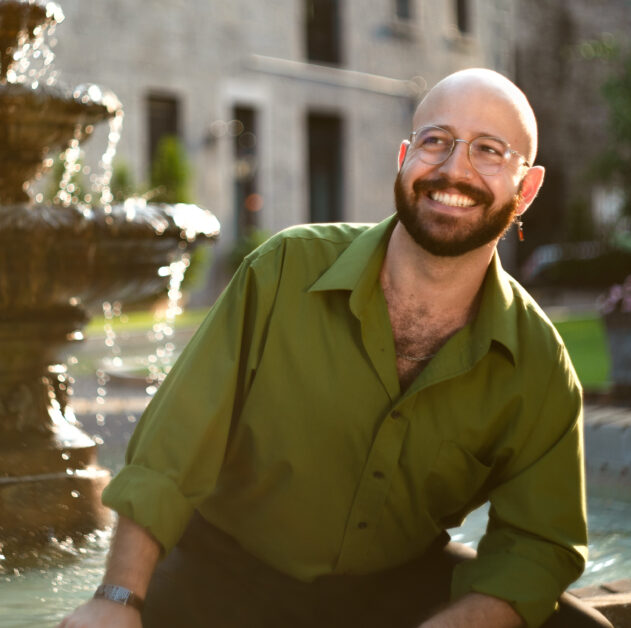Athene announces Zaytoun, an intertwining of Arabic and Baroque music, the debut solo album from tenor Haitham Haidar
Featuring Baroque and Arabic songs, poetry and improvisations

Athene is delighted to announce the release of Zaytoun (meaning ‘Olive’ in Arabic), the debut solo album from tenor Haitham Haidar. It’s a captivating collection of beautiful Baroque and Arabic songs, interlaced with poetry and musical improvisations, an exploration of the intersection between Baroque and Arabic music. Whether through instrumentation, ornamentation, or vocal production, Zaytoun highlights the natural connections between what we generally view as separate worlds. The album will be released on August 22nd, 2025, with its first single released on May 30, 2025
Haidar pairs Baroque arias and songs by composers including Monteverdi, Purcell, and Bach with Arabic songs which were his first introduction to music, some traditional and others by the Egyptian composer Sayed Darwish, one of the biggest influences on Arabic music. Haidar has added Arabic instrumentation to some of the Baroque standards, and even translated an aria from Bach’s Matthew Passion into Arabic, incorporating Arabic style into the Baroque structure. The album also includes Li Beirut, by the Lebanese poet Joseph Harb, set to the Adagio from Joaquín Rodrigo’s Concierto de Aranjuez.
Haidar is joined on the album by oud player Abdul-Wahab Kayyali and Sylvain Bergeron (archlute), Amanda Keesmaat (baroque cello), Tanya LaPerrière (baroque violin) with Abraham Ross on harpsichord. And in a rarity for classical recordings, Haidar implements multi-tracking in order to harmonize with himself in Monteverdi’s Lamento della Nina, SV 163 aria and the traditional Palestinian song Ya Taleen.
Alongside the music are three poetry tracks (from Gibran Khalil Gibran’s The Prophet) read over beautifully performed oud improvisation by Abdul-Wahab Kayyali. These tracks (prelude, intermezzo, and postlude) help present the music to follow and shape Haidar’s narrative of his own immigrant story in the unique intertwining of Arabic and Baroque music.
“As an Arab immigrant, life continues to be a journey of exploration of home, of belonging and this musical project encompasses all parts of my identity, allowing them to live and shine within one sphere rather than compartmentalized sections of myself.” Haitham Haidar
Track List:
Prelude: On Love (The Prophet)
Gibran Khalil Gibran
Vespro della Beat Vergine, SV 206: No. 3, Nigra Sum
Claudio Monteverdi, Song of Solomon 1:4-5; 2:10b-12a
El Helwa Di
Sayed Darwish
Zourouni
Sayed Darwish
Lamento della Nina, SV 163: No. 2, Amor
Claudio Monteverdi, Ottavio Rinuccini
Oedipus, Z. 583 Act III: No. 2, Music for a While
Henry Purcell, John Dryden
Wa Habibi
Anon. Traditional Arabic
Intermezzo: On Joy and Sorrow (The Prophet)
Gibran Khalil Gibran
Matthäus-passion, BWV 244: No. 39, Erbarme dich, mein Gott (Ruhmaka ya Allah)
J.S. Bach, Picander (translated by Haitham Haidar)
Grief, Keep Within
John Danyel, Samuel Danyel
Li Beirut
Joaquín Rodrigo, Joseph Harb
Le doux silence de nos bois
Honoré d’Ambruis
Ya Taleen
Traditional Palestinian arr. Shireen Abu Khader, Nareg Abajian
Postlude: On Death (The Prophet)
Gibran Khalil Gibran
Artists:
Haitham Haidar (tenor)
Sylvain Bergeron (archlute)
Abdul-Wahab Kayyali (oud)
Amanda Keesmaat (baroque cello)
Tanya LaPerrière (baroque violin)
Abraham Ross (harpsichord)
About Haitham Haidar
Haitham Haidar is a Lebanese-Palestinian Canadian tenor highly sought out for his musicality, “standout presence”, and sensitive storytelling. He is a proud graduate of Yale’s Institute of Sacred Music, McGill’s Schulich School of Music, and the University of British Columbia and currently resides in Montreal, Quebec. Haitham is praised for his ‘musical and linguistic versatility’ and his ‘bright’ and ‘innately lyrical voice’ and enjoys performing oratorio, opera, and chamber music across North America, Europe, and Asia.
He has recently been seen as a tenor soloist with Early Music Vancouver, Belgian ensemble Zefiro Torna (at the Morgenland Festival in Osnabrück) and in the lead role as the Evangelist in Bach’s St. John Passion at the Winnipeg Baroque Festival. He has also been a recent soloist with TENET Vocal Artists in New York City, with Orchestre Arion in Montreal, as well as played the role of Evangelist in Schütz’s Weinachtshistorie with Folger Consort in Washington DC. He has also performed as a soloist and ensemble member with groups like Seraphic Fire in Miami and Skylark Ensemble in Massachusetts. Haitham has been recorded as a soloist and ensemble member on a few albums namely Distance with the choir of St Andrew and St Paul in Montreal, Schutz Christmas Story with Yale Schola Cantorum in New Haven, and L’Heure Mauve by Pierre LaPointe in Montreal. Haitham is also a featured soloist on Austin based Conspirare’s GRAMMY® nominated album House of Belonging. You may also find Haitham’s voice in one of the temples in the game Assassins Creed: Origins. Haitham is a proud member of Kaleidoscope Vocal Ensemble, a group that unites music excellence and diversity while offering highly educational and practical experiences to students from middle school to graduate school. Haitham’s debut solo album Zaytoun has been a dream come true. Producing and artistically leading an album with such an amazing team is a true gift.











